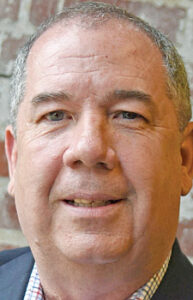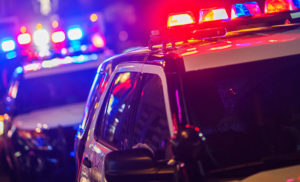A man is pulled over for a traffic stop in the Golden Triangle. After the officer approaches the vehicle, it’s discovered the driver has marijuana in his pocket and a firearm in his glove box.
Both were purchased legally, as the driver is not a convicted felon and has a state-issued medical marijuana card.
What happens next?
Mississippi Department of Public Safety Commissioner Sean Tindell, along with leaders of several area law enforcement agencies told The Dispatch it depends.

“I can’t tell you what each individual law enforcement agency across the state is going to do … because there’s going to be discretion in each area as to how that’s handled,” Tindell said Tuesday. “You may find a situation where locally it might not be an issue, but then you go into a neighboring county and law enforcement might take a different position.”
Tindell said this variation may come from the newness of the laws on medical cannabis possession, but confusion also arises from differences between federal and state law.
Under the federal Controlled Substances Act, marijuana is still considered a Schedule I Controlled Substance and is banned, and the Gun Control Act prohibits a person who uses a controlled substance from shipping, transporting, receiving or possessing firearms or ammunition.
But Mississippi now recognizes medicinal marijuana and allows it to be possessed and distributed under controlled circumstances through the Mississippi Medical Cannabis Program. Namely, a person with a state-issued medical marijuana card and a prescription can receive a certain quantity of medical cannabis from a licensed dispensary. To date, more than 17,000 Mississippians hold medical marijuana cards, according to the state Department of Health website.
Lowndes County Public Defender Amanda Meadows said there is no state law against simply the simultaneous possession of prescribed medical marijuana and a firearm, due to an anti-discrimination clause in the Mississippi Medical Cannabis Act.

“In general, the feds are allowed to regulate federal trade and anything that touches or concerns interstate travel or interstate commerce,” Meadows said. “The fact that each individual state has this within their state boundaries is really not a federal issue. … We’re allowing this in a medical controlled situation.”
However, there are caveats. One, Meadows said, is marijuana cannot be consumed publicly, even if it is medicinal. Having a gun in that situation could make that issue worse.
“You don’t automatically lose your gun rights just because you pursue an alternative form of medication,” Meadows said. “But … I can’t be consuming cannabis and have a gun on my hip.”
Different departments, different outlooks
In a vehicle, possessing medical cannabis and a firearm together legally would require the cannabis to be stored in the trunk in a sealed container, said Lt. Tyler Davis, over narcotics and investigations at the Starkville Police Department. Otherwise, you run the risk of a DUI charge.
For area sheriff’s offices, the intersection between medical marijuana and firearms is currently being interpreted differently.

“My gut feeling… as long as you’re within the scope of your medical marijuana card, I would say both of them would be legal,” Oktibbeha County Sheriff Steve Gladney said. “The only time I can see that it wouldn’t be legal is if you’re outside of the scope of your medical marijuana prescription. It would enhance the charge. But as long as you’re legal with the medical marijuana card, you’d be legal to possess a firearm.”
Lowndes County Sheriff Eddie Hawkins, a former Mississippi Bureau of Narcotics agent, agrees with Gladney.
Citizens with medical marijuana cards are only allowed to receive up to 6 Mississippi Medical Cannabis Equivalency Units in a week and not more than 24 units in 30 days. One MMCEU is equivalent to 3.5 grams of medical cannabis flower, 1 gram of medical cannabis concentrate or 100 milligrams of THC in an infused product.
The line between a misdemeanor and a felony is 30 grams, which is well over the limit for a medical marijuana card. Only a felony amount would result in LCSD seizing the weapon or enhancing the charge, Hawkins said.
Davis said given probable cause, SPD will be checking for medical marijuana cards and weighing what the citizen has in their possession, since cards limit how much a patient can possess at one time.
On a misdemeanor charge, firearms can be temporarily seized as evidence if there is suspicion the firearm is not legally possessed, Davis said. On felony charges, firearms are temporarily seized for evidence as they will lead to an enhancement of the felony charge.
Clay County Sheriff Eddie Scott said he hopes to see clarity from higher courts on how to react to the combination, but he said if a citizen is in legal possession of medical marijuana and a firearm, he “doesn’t see any way to seize a weapon.”
Scott said he has yet to see medicinal marijuana and firearms combined in the county, and his deputies have not received any official training on the topic.

“I haven’t gotten any guidance that says they can’t have a firearm,” Scott said. “This stuff is ongoing. It is brand new. (Alcohol and Beverage Control) is supposed to be coming in and putting on some training classes for us, and as of right now, if one of my deputies called me and had that situation on the side of the road, I would have to make some phone calls.”

Likewise, Chief Joseph Daughtry of the Columbus Police Department said it is still too early for him to say exactly how his department will react to a combination of cannabis and firearms. “Until we’ve started getting mandates from the state, we’re going to deal with the same laws as far as DUIs and the same laws as far as carrying a weapon, and that’s all I can tell you,” Daughtry said.
Buying a firearm
The state’s medical cannabis nondiscrimination clause does not prevent card holders from purchasing a firearm. But federal regulations can stop them.
In 2017, the Bureau of Alcohol, Tobacco, Firearms and Explosives added a question to its Firearm Transaction Form asking if the applicant uses marijuana, warning the usage is illegal federally, no matter the laws of the applicant’s state.
If a medical marijuana card holder checks yes, Hawkins said, their application will be denied. But if they check no, they will be committing perjury.

“One can possess medical marijuana and can possess a firearm,” Hawkins said. “However, if you go to buy a new firearm, in the questionnaire, one of the questions it asks is if you regularly use marijuana. If so, they will deny you from being able to purchase a firearm.”
You can help your community
Quality, in-depth journalism is essential to a healthy community. The Dispatch brings you the most complete reporting and insightful commentary in the Golden Triangle, but we need your help to continue our efforts. In the past week, our reporters have posted 43 articles to cdispatch.com. Please consider subscribing to our website for only $2.30 per week to help support local journalism and our community.







